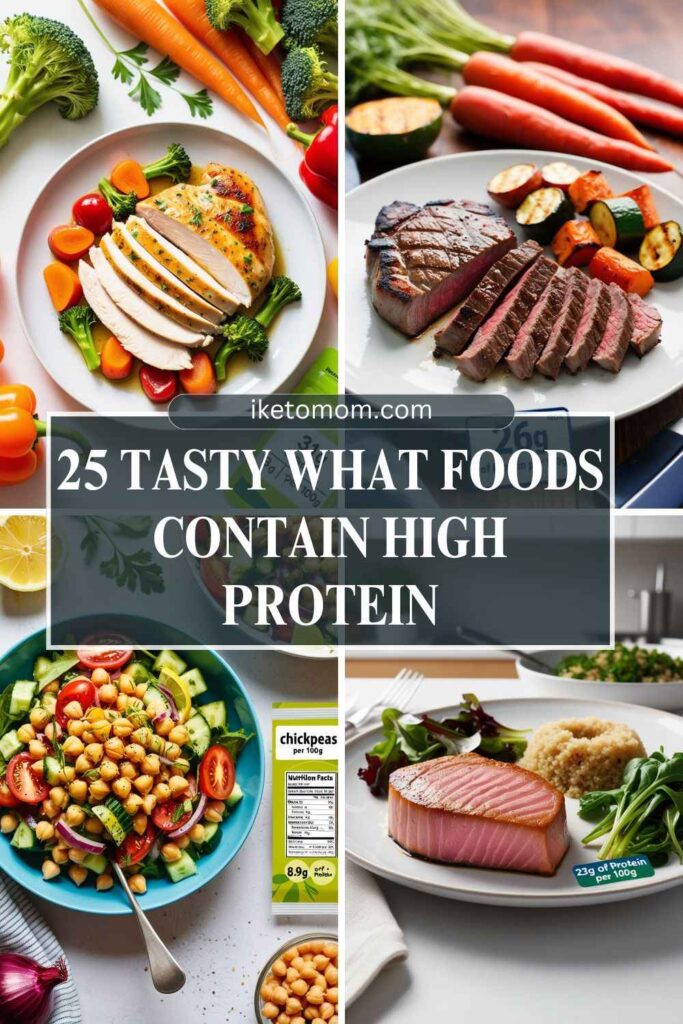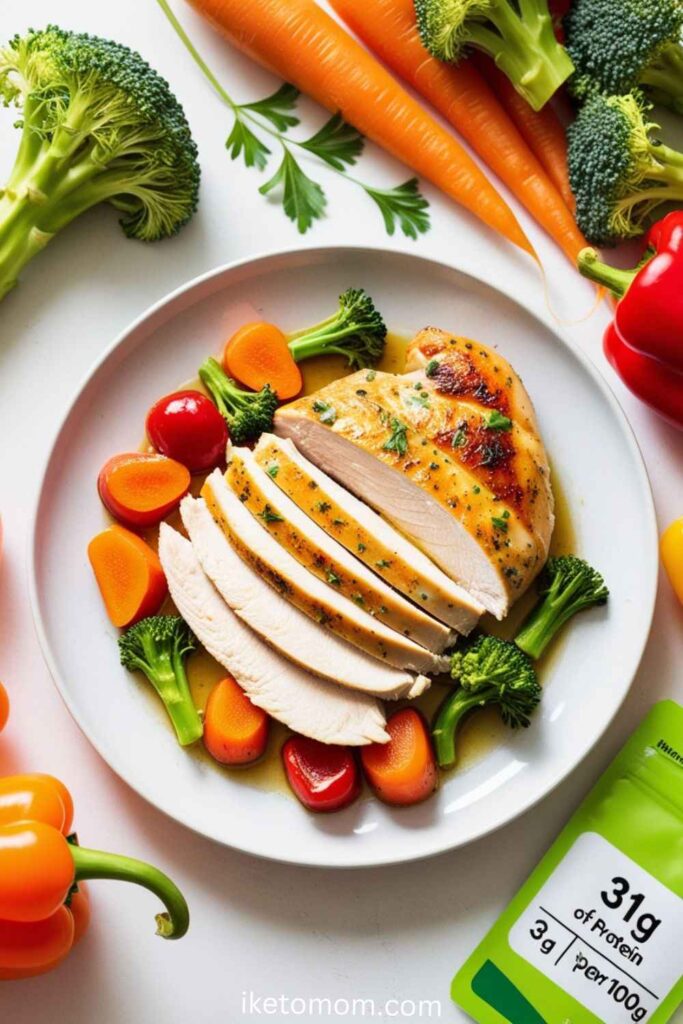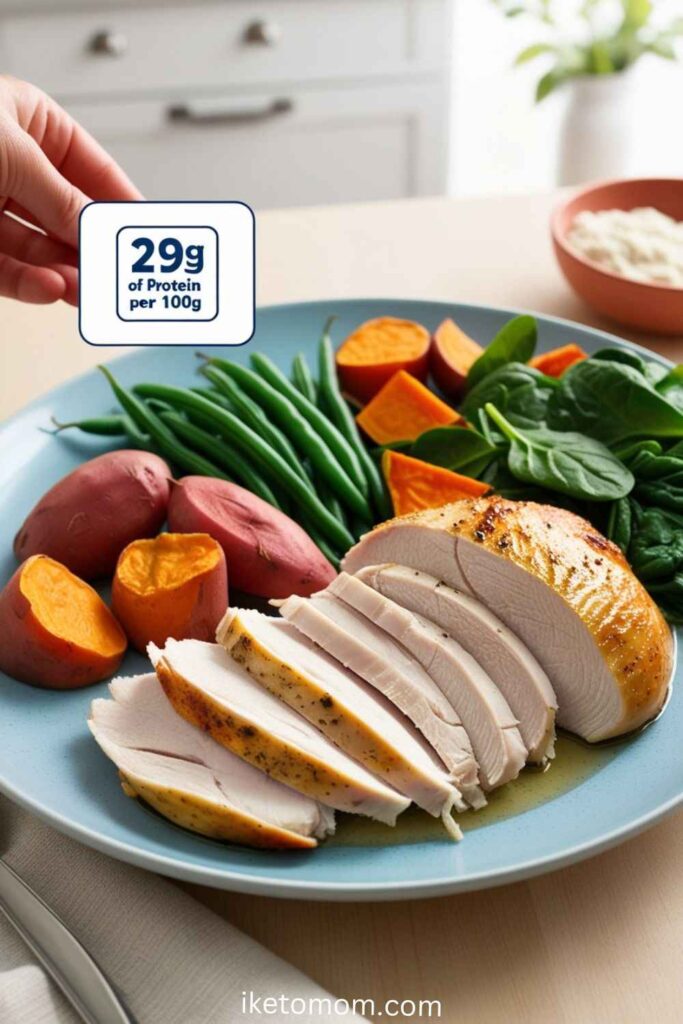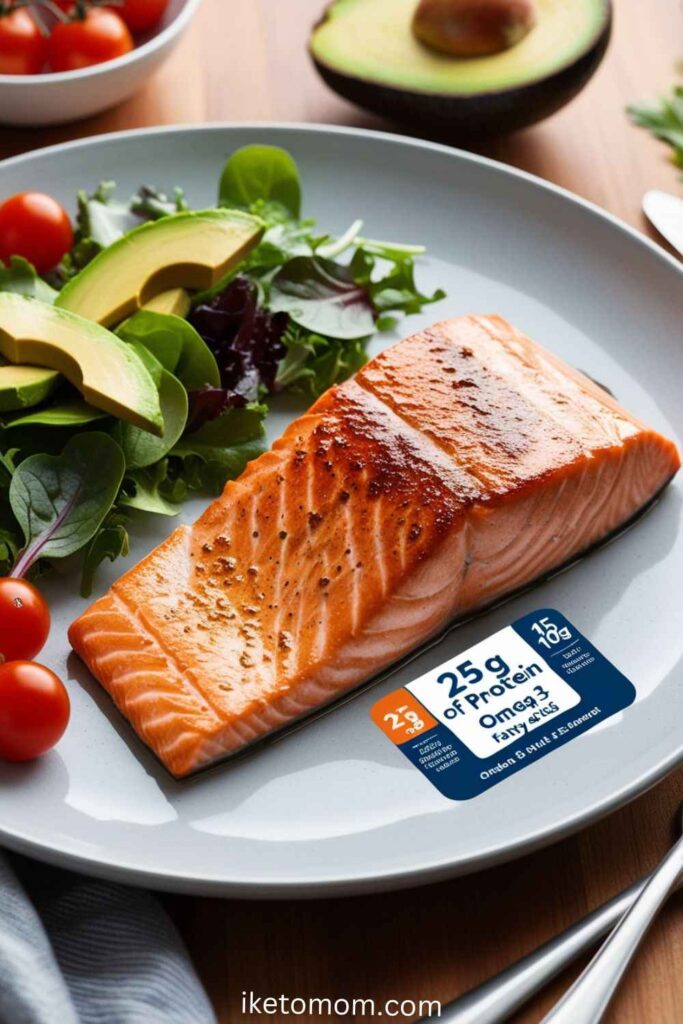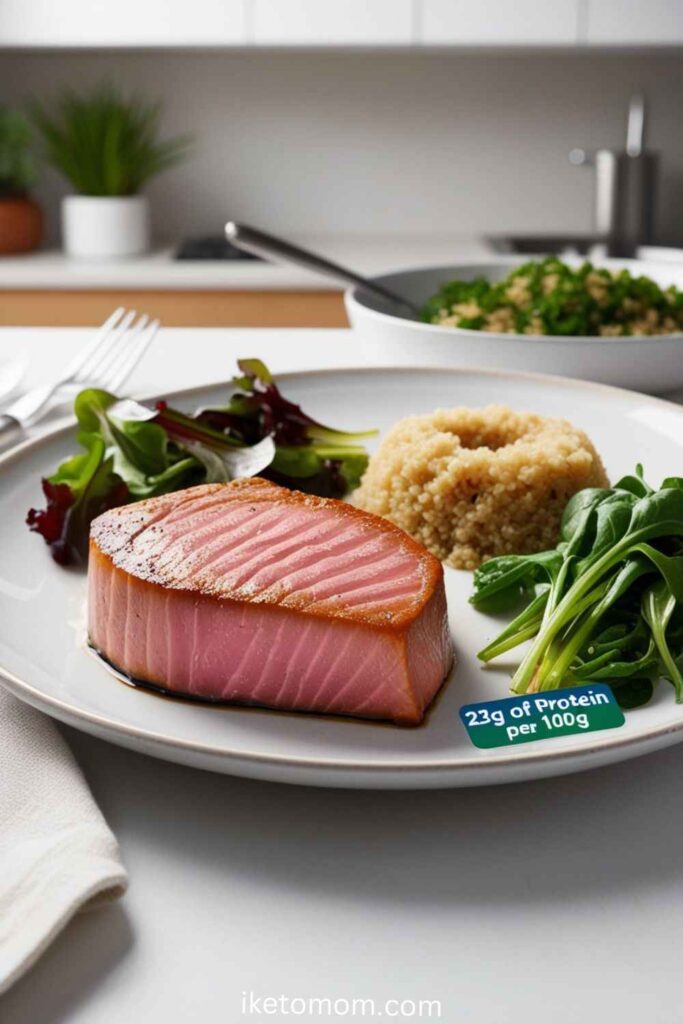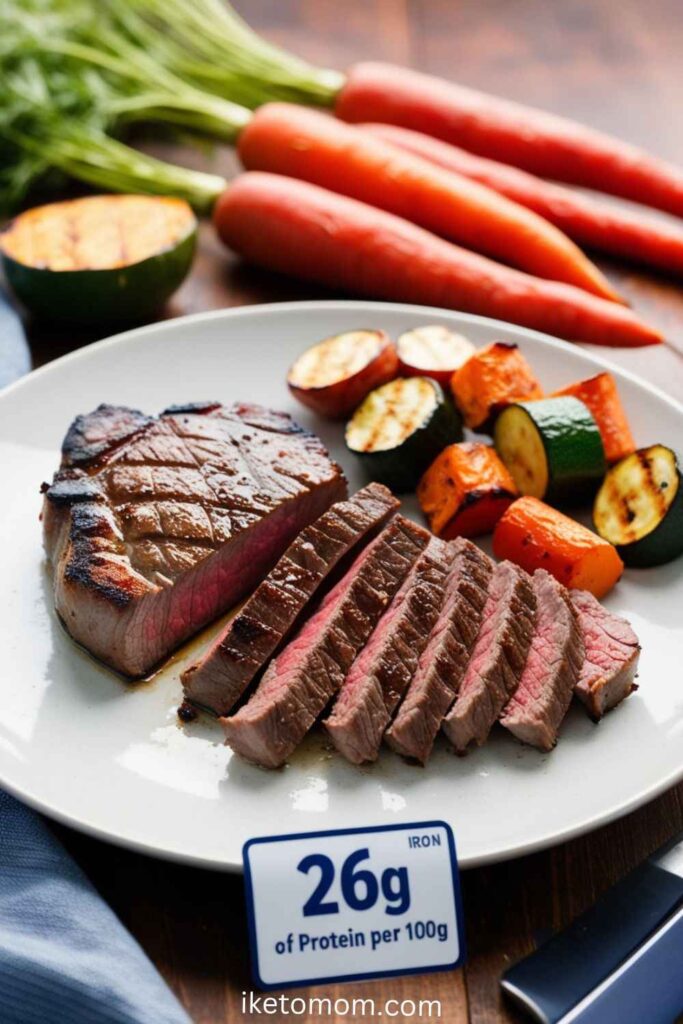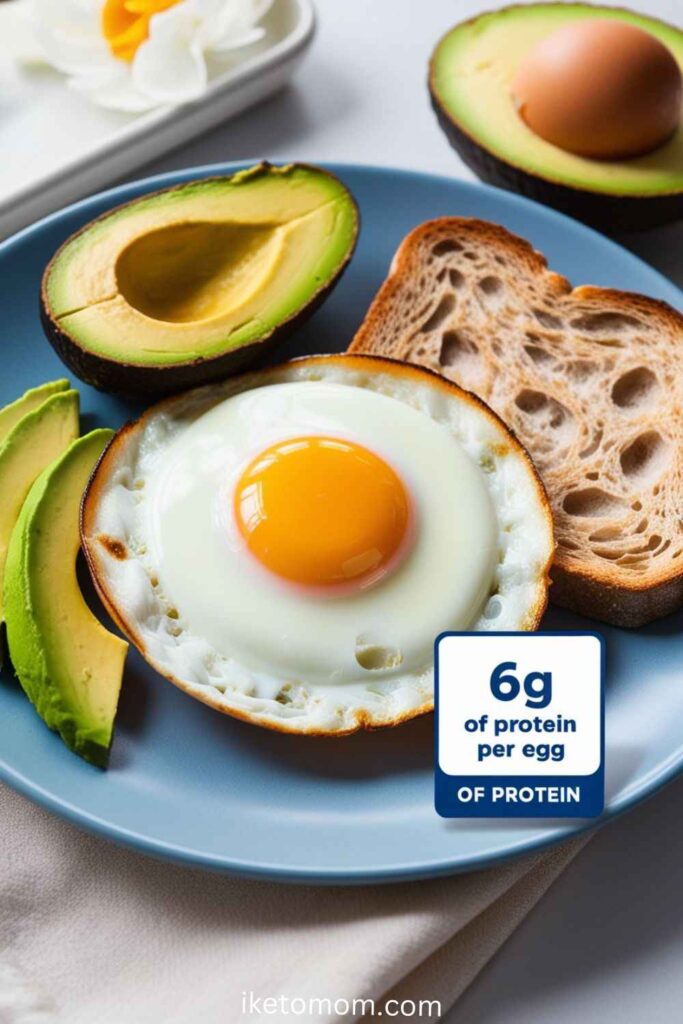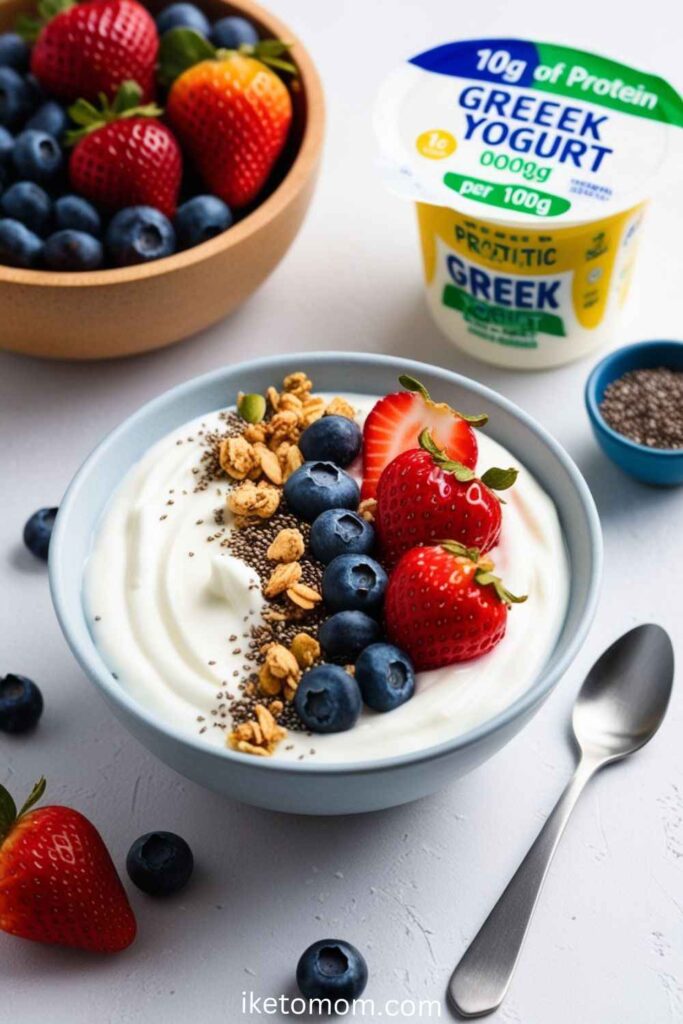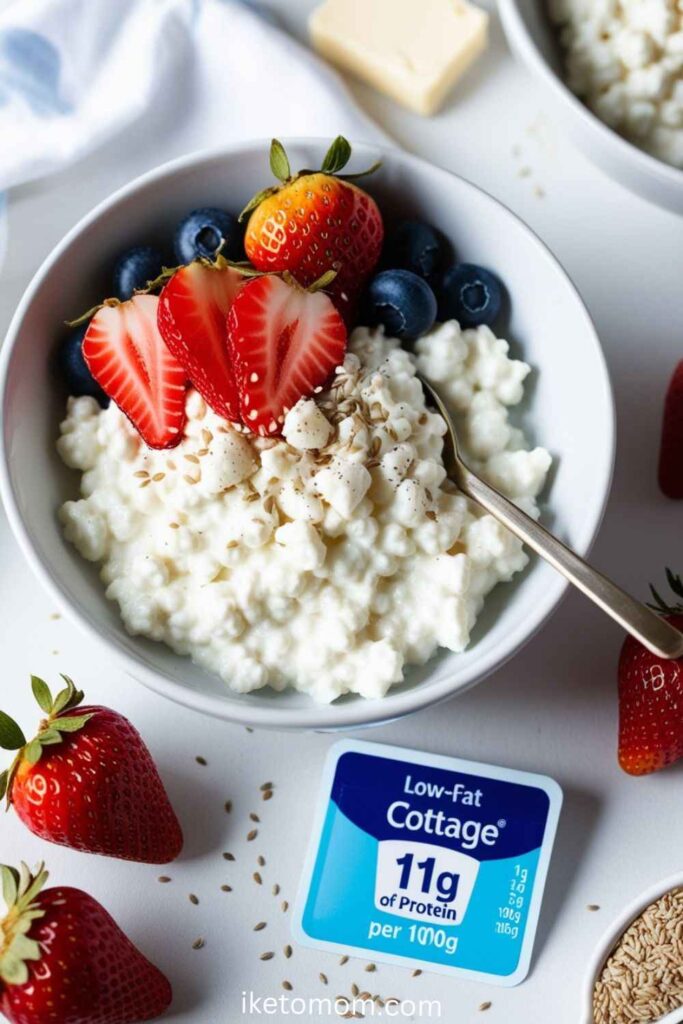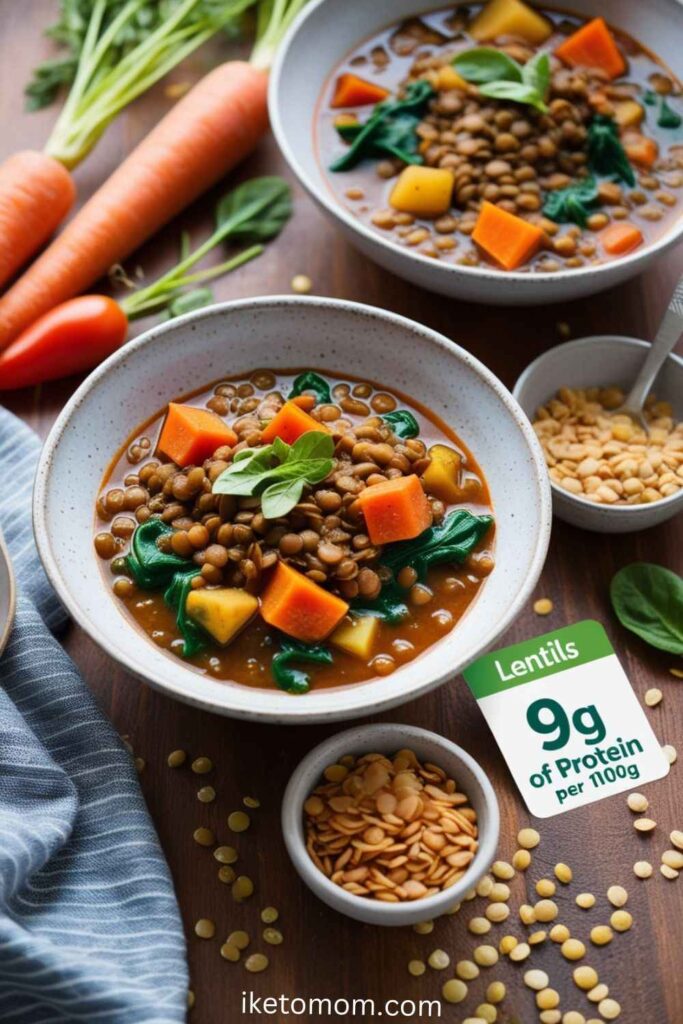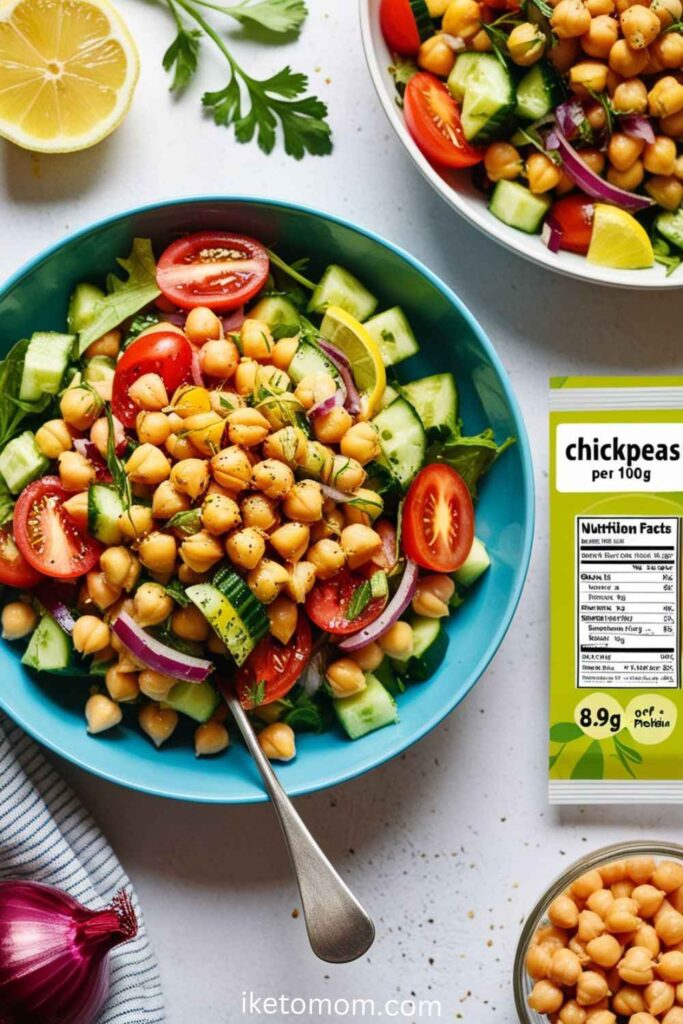In this article, we will explore 25 tasty What Foods Contain High Protein that will help you meet your daily protein needs. Whether you’re a meat lover, a vegetarian, or someone looking for plant-based options, this list has something for everyone. Let’s dive into the best protein-rich foods that can enhance your diet and support your health goals.
Protein is one of the three macronutrients, alongside carbohydrates and fats, that are essential for maintaining a healthy and balanced diet. It plays a vital role in building and repairing tissues, producing enzymes and hormones, and supporting immune function. Additionally, protein is a key player in maintaining healthy muscles, bones, and skin. For anyone looking to lead a healthy lifestyle, whether you’re aiming to build muscle, manage your weight, or improve overall health, incorporating enough protein into your daily meals is crucial.
High-protein foods are especially important for muscle building, as they help repair and grow muscle fibers after exercise. Protein also helps with weight management by promoting feelings of fullness, which can reduce overall calorie intake. Furthermore, a diet rich in protein can boost metabolism, making it easier to burn fat.
What Foods Contain High Protein
1. Chicken Breast
Chicken breast is one of the most popular and widely consumed sources of high-quality protein. It’s known for being lean, low in fat, and packed with nutrients, making it an excellent choice for those looking to increase their protein intake while keeping their calorie consumption in check.
Nutrition Information:
- Protein: 31g per 100g of cooked chicken breast.
- Calories: 165 calories per 100g.
- Fat: 3.6g per 100g (mostly healthy unsaturated fats).
- Carbohydrates: 0g (chicken breast is carb-free).
Benefits and Versatility in Meals: Chicken breast is a versatile ingredient that can be easily incorporated into a variety of dishes, from salads and sandwiches to stir-fries, soups, and grilled meals. It’s perfect for meal prepping, as it can be cooked in bulk and used throughout the week in different recipes. Its mild flavor allows it to pair well with almost any seasoning, from simple herbs and spices to bold marinades and sauces.
Beyond its protein content, chicken breast is also a good source of B vitamins, particularly niacin (vitamin B3) and vitamin B6, which support energy production and help maintain healthy metabolism. Additionally, it provides essential minerals such as phosphorus and selenium, both of which play important roles in bone health and immune function.
Whether you’re aiming to build muscle, lose weight, or simply enjoy a healthy meal, chicken breast is a nutrient-packed food that fits easily into a balanced diet.
2. Turkey
Turkey is another excellent source of high-quality protein, making it a fantastic option for anyone looking to boost their protein intake while keeping fat consumption low. Known for its lean meat, turkey is a popular choice for healthy eaters and those looking to maintain or build muscle without adding excess fat to their diet.
Nutrition Information:
- Protein: 29g per 100g of cooked turkey.
- Calories: 135 calories per 100g.
- Fat: 1g per 100g (lean source of protein).
- Carbohydrates: 0g (turkey is carb-free).
Benefits and Versatility in Meals: Turkey’s low fat content makes it an ideal choice for anyone aiming to reduce fat intake, and its high protein content ensures it supports muscle growth and repair. It’s often used as a lean alternative to red meats in dishes like burgers, salads, and sandwiches. Turkey is also great for roasting, grilling, or baking, and it can easily be seasoned with a variety of spices or herbs for added flavor.
In addition to being a protein powerhouse, turkey provides essential nutrients such as iron, zinc, and B vitamins (especially niacin and vitamin B6), which are important for energy production, immune support, and healthy metabolism. Its low fat and calorie content make it perfect for those who are watching their weight or looking for a nutritious meal option that supports overall health and fitness goals.
Turkey is not only versatile and easy to prepare, but it’s also a healthy, nutrient-dense food that can be incorporated into a variety of dishes for a satisfying meal.
3. Salmon
Salmon is not only a delicious fish but also a powerhouse of protein and healthy fats. It is widely praised for its rich nutrient profile, including high-quality protein and an abundance of omega-3 fatty acids, which are essential for heart and brain health. Whether grilled, baked, or pan-seared, salmon is a versatile and flavorful addition to any diet.
Nutrition Information:
- Protein: 25g per 100g of cooked salmon.
- Calories: 206 calories per 100g.
- Fat: 12g per 100g (mostly healthy unsaturated fats, including omega-3s).
- Carbohydrates: 0g (salmon is carb-free).
Benefits and Versatility in Meals: Salmon’s high protein content makes it an excellent choice for those looking to build muscle or maintain a balanced diet. The omega-3 fatty acids found in salmon are known to promote heart health by reducing inflammation, lowering blood pressure, and improving cholesterol levels. These healthy fats also support brain function, making salmon a great food for overall well-being.
In addition to its health benefits, salmon is incredibly versatile in cooking. It can be prepared in a variety of ways, from a simple grilled fillet to a flavorful baked dish or incorporated into sushi. Its rich, savory flavor pairs well with a wide range of seasonings, herbs, and marinades. Salmon can be enjoyed in salads, bowls, or as the centerpiece of a healthy dinner.
With its combination of high-quality protein and beneficial fats, salmon is a perfect choice for anyone looking to support muscle health, improve heart health, and enjoy a flavorful, nutrient-dense meal.
4. Tuna
Tuna is one of the most convenient and protein-packed options for those looking to add lean protein to their diet without much preparation. Available in both fresh and canned forms, tuna is an affordable and versatile source of protein that can be easily incorporated into a wide variety of meals.
Nutrition Information:
- Protein: 23g per 100g of canned tuna in water.
- Calories: 132 calories per 100g.
- Fat: 1g per 100g (lean source of protein).
- Carbohydrates: 0g (tuna is carb-free).
Benefits and Versatility in Meals: Tuna is not only high in protein but also provides essential nutrients like vitamin D, selenium, and omega-3 fatty acids, all of which are important for maintaining overall health. Its low fat content makes it an ideal choice for those seeking a lean source of protein, while its quick preparation makes it perfect for busy individuals looking for a healthy meal on the go.
Whether you’re tossing it into a salad, mixing it into pasta, making a tuna sandwich, or preparing it as a sushi roll, tuna can be enjoyed in a variety of ways. Canned tuna is especially convenient for quick meals and can be stored in the pantry, making it a staple for those looking for a high-protein snack or meal option without the need for extensive cooking.
Tuna is a great go-to food for anyone looking to get a boost of protein quickly, without compromising on taste or nutrition.
5. Lean Beef
Lean beef is a nutrient-dense source of high-quality protein, providing essential amino acids that the body needs for muscle growth, repair, and overall health. Not only is it rich in protein, but lean beef also offers a wealth of vitamins and minerals, making it an excellent addition to a balanced diet.
Nutrition Information:
- Protein: 26g per 100g of lean beef.
- Calories: 250 calories per 100g.
- Fat: 10g per 100g (with the lean cuts containing less fat).
- Carbohydrates: 0g (lean beef is carb-free).
Benefits and Versatility in Meals: Lean beef is a great source of bioavailable iron, which is essential for oxygen transport in the blood and overall energy levels. It also provides zinc, selenium, and B vitamins (particularly vitamin B12), which play crucial roles in immune function, metabolism, and the production of red blood cells.
Beyond its nutritional benefits, lean beef is incredibly versatile in cooking. Whether it’s grilled, pan-seared, roasted, or used in stews and soups, lean beef can be enjoyed in a wide variety of dishes. It pairs well with vegetables, grains, and legumes, making it easy to create a nutrient-dense and satisfying meal.
Lean beef offers a delicious and nutritious way to fuel your body with protein, vitamins, and minerals, making it a great option for anyone looking to improve muscle health, boost energy, and enjoy a rich, flavorful meal.
6. Eggs
Eggs are one of the most versatile and affordable sources of high-quality protein available. They are considered a complete protein, meaning they contain all nine essential amino acids that the body cannot produce on its own. With their rich nutrient profile, eggs are a staple in many diets around the world.
Nutrition Information:
- Protein: 6g per egg (large size).
- Calories: 70 calories per egg.
- Fat: 5g per egg (including healthy fats).
- Carbohydrates: 0.6g per egg.
Benefits and Versatility in Meals: Eggs are packed with high-quality protein and provide a wide range of essential vitamins and minerals, including vitamin D, vitamin B12, phosphorus, and selenium. They are especially known for their ability to support muscle growth and repair, making them a great option for athletes or anyone looking to increase their protein intake.
What makes eggs so popular is their incredible versatility. They can be boiled, scrambled, poached, fried, or used in baking. Eggs also pair well with a variety of other foods, whether added to salads, incorporated into breakfast dishes, or used as an ingredient in cooking and baking. With their quick preparation time and ability to complement virtually any meal, eggs are a convenient and nutritious food that can fit into any lifestyle.
Eggs are a great choice for anyone looking to add a complete source of protein to their diet while enjoying a range of cooking options.
7. Greek Yogurt
Greek yogurt is a creamy, delicious, and protein-packed dairy product that has become a popular choice for those looking to increase their protein intake. Unlike regular yogurt, Greek yogurt is strained, which results in a thicker texture and higher concentration of protein. It also contains beneficial probiotics, making it a great choice for supporting digestive health.
Nutrition Information:
- Protein: 10g per 100g of Greek yogurt (unsweetened).
- Calories: 59 calories per 100g.
- Fat: 0.4g per 100g (varies with fat content of yogurt).
- Carbohydrates: 3.6g per 100g (in unsweetened varieties).
Benefits and Versatility in Meals: Greek yogurt is not only rich in protein but also packed with probiotics, which are beneficial bacteria that help support gut health and boost the immune system. The protein in Greek yogurt is essential for muscle repair and growth, making it an ideal post-workout snack or a part of any meal.
Greek yogurt can be enjoyed in many ways. It’s perfect for breakfast when topped with fruits, nuts, and seeds, or mixed into smoothies for an extra protein boost. It can also be used as a creamy base for savory dishes like salad dressings, dips (such as tzatziki), or as a substitute for sour cream. The versatility and health benefits of Greek yogurt make it a great addition to any diet, whether you’re looking to improve digestion, build muscle, or simply enjoy a tasty, nutritious treat.
With its high protein and probiotic content, Greek yogurt is an excellent, easy-to-incorporate option for boosting both your protein intake and digestive health.
8. Cottage Cheese
Cottage cheese is a popular dairy product known for its mild flavor, creamy texture, and high protein content. It’s an excellent choice for those looking to add more protein to their diet while keeping fat intake low. Additionally, cottage cheese is rich in calcium, which is essential for bone health.
Nutrition Information:
- Protein: 11g per 100g of cottage cheese (low-fat variety).
- Calories: 98 calories per 100g.
- Fat: 4g per 100g (varies based on fat content).
- Carbohydrates: 3.4g per 100g.
Benefits and Versatility in Meals: Cottage cheese is a great source of high-quality protein that supports muscle repair and growth. It’s also packed with calcium, which helps in maintaining strong bones and teeth. Its low-fat content makes it an ideal choice for anyone watching their fat intake while still needing a protein boost.
Cottage cheese is incredibly versatile and can be used in both savory and sweet dishes. It’s commonly eaten as a snack, often paired with fruits like pineapple or berries for a sweet treat. Alternatively, it can be added to salads, used as a topping for baked potatoes, or blended into smoothies for extra creaminess. Cottage cheese also works well in recipes like lasagna, pancakes, and dips, making it a staple in many kitchens.
With its high protein, low-fat content, and calcium benefits, cottage cheese is a nutritious and adaptable food that fits well into a variety of meals and snacks.
9. Lentils
Lentils are an excellent plant-based protein source, making them a perfect choice for vegetarians, vegans, or anyone looking to incorporate more plant-based options into their diet. They are also rich in fiber, which helps with digestion and promotes feelings of fullness, making them a great option for weight management and overall health.
Nutrition Information:
- Protein: 9g per 100g of cooked lentils.
- Calories: 116 calories per 100g.
- Fat: 0.4g per 100g.
- Carbohydrates: 20g per 100g (mostly complex carbs).
Benefits and Versatility in Meals: Lentils are not only high in protein, but they are also packed with fiber, which helps support digestive health and maintain stable blood sugar levels. They provide essential minerals like iron, folate, and magnesium, making them a valuable addition to any diet. Lentils are also low in fat, which makes them an ideal food for anyone looking to maintain a healthy weight.
Lentils are incredibly versatile and can be used in a wide variety of dishes, from soups and stews to salads, curries, and veggie burgers. They come in various types, such as green, red, and black, each with its own unique texture and flavor, allowing for endless culinary possibilities. Whether you’re looking to add protein to a meatless meal or simply enjoy a hearty dish, lentils are a nutritious and satisfying choice.
With their plant-based protein, fiber, and rich nutrient profile, lentils are an excellent food to include in a balanced diet, supporting both muscle health and overall wellness.
10. Chickpeas
Chickpeas, also known as garbanzo beans, are a highly versatile and nutritious legume that provides a great source of plant-based protein. They are commonly used in a variety of dishes around the world, including salads, stews, and dips like hummus. Chickpeas are also high in fiber, making them an excellent choice for digestive health.
Nutrition Information:
- Protein: 8.9g per 100g of cooked chickpeas.
- Calories: 164 calories per 100g.
- Fat: 2.6g per 100g.
- Carbohydrates: 27.4g per 100g (mostly complex carbs).
Benefits and Versatility in Meals: Chickpeas are rich in protein and fiber, which contribute to maintaining energy levels, promoting fullness, and supporting digestive health. They also provide essential vitamins and minerals like folate, iron, and magnesium, which help support metabolism, red blood cell production, and overall wellness.
Chickpeas are incredibly versatile in cooking. They can be added to salads for extra protein, tossed into soups and stews, or blended to make creamy hummus. Roasted chickpeas make a healthy and crunchy snack, and they can also be used in vegetarian burgers or patties. The mild flavor of chickpeas allows them to adapt to a variety of seasonings and cuisines, making them a staple in both Mediterranean and Middle Eastern dishes.
With their high protein, fiber content, and nutrient density, chickpeas are a great addition to any diet, especially for those looking to incorporate more plant-based options into their meals.
FAQ
What are some of the best high-protein foods?
High-protein foods include chicken breast, turkey, salmon, tuna, eggs, Greek yogurt, lean beef, cottage cheese, lentils, and chickpeas. These foods provide a variety of protein sources from both animal and plant-based options.
How much protein do I need per day?
The recommended daily protein intake varies depending on age, gender, and activity level. On average, adults should aim for 0.8 grams of protein per kilogram of body weight. Active individuals or those building muscle may need more, ranging from 1.2 to 2.0 grams per kilogram of body weight.
Can I get enough protein on a plant-based diet?
Yes! Many plant-based foods are rich in protein, such as lentils, chickpeas, quinoa, tofu, tempeh, and edamame. By incorporating a variety of plant-based protein sources, you can easily meet your protein needs without animal products.
Are high-protein foods good for weight loss?
High-protein foods can be beneficial for weight loss, as they help promote satiety and muscle preservation while dieting. Protein-rich foods can reduce hunger, prevent overeating, and support the maintenance of lean muscle mass, which is crucial for a healthy metabolism.

I’m Priscilla Swahn, a registered dietitian with a master’s degree in nutritional sciences. With over a decade of experience in holistic nutrition, I specialize in creating delicious keto recipes to help you enjoy a healthy lifestyle. On iKetoMom, you’ll find a variety of recipes for every meal—hearty breakfasts, satisfying lunches, mouthwatering dinners, indulgent desserts, and refreshing drinks. My recipes make keto living easy and enjoyable for the whole family. Featured in EatingWell and MindBodyGreen, I also collaborate with health centers and corporate companies to share my expertise. Join me and discover the joy of keto cooking!

